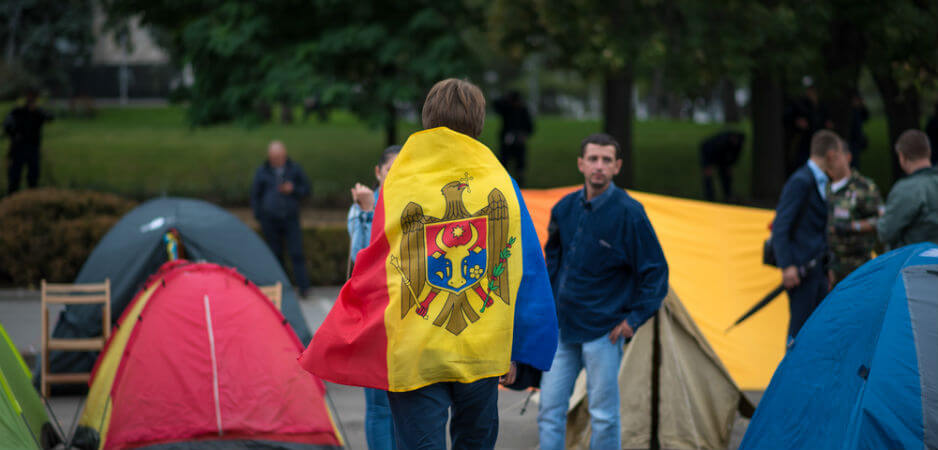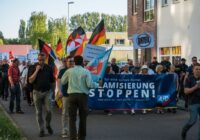Growing dissatisfaction with the government unites Moldovan society.
On April 24, protesters in Chisinau’s main square carried posters with slogans of “Freedom” and “Down with Capitalism.” Unhappy with the current rulers and ongoing political crisis, over 5,000 people joined an anti-government rally in Moldova’s capital. Although critical of the elite, the demonstrators seemed to have polarizing views on where Moldova should be headed.
Protesters soon moved to the residence of Vlad Plahotniuc, Moldova’s richest oligarch and politician—nicknamed puppeteer for his influence over the government. His opponents accuse him of bribing deputies and affecting major political decisions in the country. As the protesters surrounded his house, hundreds of policemen (some armed) arrived to protect him. Six people were hospitalized after civilians clashed with law enforcement.
Shaking the Country
The latest protest is the continuation of other large-scale demonstrations that have shaken the country since 2015. A civil movement, known as Dignity and Truth, and a party of the same name lead the protests; they have managed to organize the biggest anti-government rallies since 2009. The demands are simple: the resignation of the government, new elections and transparent politics.
The majority of protesters are middle-aged or elderly who have a hard time making ends meet in the current economic situation. Moldova is one of the poorest European states, and with major corruption scandals rocking the country, its citizens are becoming increasingly pessimistic about economic progress.
“The government should stop stealing from the people,” says Vasile Volturean, a protester who is currently unemployed. As I interview him in the middle of the demonstration, he warns me about possible threats to international correspondents. Volturean comes from the city of Drochia in the north of the country. “The government tried to block the public transport so people would not get to Chisinau,” he adds. “The protesters had to use personal vehicles or hitchhike to reach the capital.”
“The government wants youth to leave the country, and only old people to remain,” he continues. “This way, no one would protest and threaten their rule.”
Although the protest failed to gather many young people, Vasile thinks they will join the next rallies.
“Young people emigrate in huge numbers,” Vera Hostin, another protester who has been actively involved in the rallies in 2009, tells me. A former businesswoman, she is now retired but is still a deputy in a local village council. Her own children have left the country while she remained.
“We are a small country, and we cannot deal with this situation by ourselves,” Hostin says. She hopes for more involvement by the European Union (EU) in settling the political crisis in Moldova.
Although critical of Russia and pro-Russian parties, Hostin fears a “Ukrainian scenario” in Moldova. Most of all, she is afraid of war erupting following a radical revolution. To avoid this, she thinks the people must avoid any radical actions.
A Divided Society
The unrest represents the divide that currently exists in Moldovan society. The major parties—the Liberal Democrats, the Democratic Party and the Liberals—formed a coalition government and are connected to Plahotniuc, with a silent agreement from the Communist Party. The country, strongly divided along pro-Russian and pro-European lines, was seen as a potential partner by the EU after signing the Association Agreement. The current coalition pushed to strengthen ties with Europe, which enabled it to receive a large amount of votes.
Now, pro-Russian and pro-European voters are gathering against the government. The protests began in 2015 when $1 billion was stolen from the country’s budget.
During the investigations, Moldova’s former prime minister and oligarch, Vlad Filat, was accused of corruption. However, citizens were generally dissatisfied with the investigations and the ongoing corruption inside the government as well as oligarchic control over political decisions in the country. The economic situation in the country remains very difficult, with an average monthly salary of $200 a month.
However, the opposition does not have a clear plan of action. During the protest, Kirill Motpan, one of Dignity and Truth’s leaders, tried to calm the protesters down by saying they should come up with a set of actions for the next day. Despite the people’s dissatisfaction, Moldovan politicians seemed reluctant to encourage any direct action and simply wanted to demonstrate without doing anything concrete.
The opposition is not united, with different parties lacking a joint plan. The opposition currently includes both the left- and right-wing parties having independent protests. Both groups cannot unite because of opposite attitudes toward the West and EU integration. The latter is supported mostly by right-wing parties, while the socialists and communists espouse pro-Russian aspirations.
Justice in Our Country
Still, the protesters appear more determined. “If nothing comes out of the protests, I am ready to fight like it was in Ukraine,” says Volturean. His fellow protester, Vasile Tzurkan, agrees: “We should fight for justice in our country and not let the government rob us.”
For Tzurkan, a revolutionary outcome of the events is probable. Unlike many Moldovans, fearful after the events in neighboring Ukraine, he thinks it is important to pressure the government and force its resignation. For him, the protest is not so much about the EU or Russia—although he considers the latter to be an enemy of Moldova. Rather, the protest is a way to rid his country of corruption.
“I have been working in Moscow as a construction worker for years, and when I finally came back home, I could not earn anything,” says another protester, Andrei Mura. Unsatisfied with the economy in the country, he drove his entire family to join the demonstration. “We have been very patient, and never reached anything. How much longer do we wait?”
Many Moldovans are not only unhappy with the current government, but also with the EU for not playing an active part in solving the crisis. The country is a major destination of Russian propaganda, too. A difficult and bloody history with Transnistria, a Russian-speaking territory with claims of independence, complicates the situation.
The protest ended how it started: on the main square. The protesters managed to sign a resolution, and some clashed with the police, while the leaders ineffectively tried to stabilize the situation.
The opposition has promised to continue the protests and gather more people from other regions. With so many varying views, it is difficult to predict if they will find joint solutions.
The views expressed in this article are the author’s own and do not necessarily reflect Fair Observer’s editorial policy.
Photo Credit: Mihail P / Shutterstock.com
 We bring you perspectives from around the world. Help us to inform and educate. Your donation is tax-deductible. Join over 400 people to become a donor or you could choose to be a sponsor.
We bring you perspectives from around the world. Help us to inform and educate. Your donation is tax-deductible. Join over 400 people to become a donor or you could choose to be a sponsor.
Support Fair Observer
We rely on your support for our independence, diversity and quality.
For more than 10 years, Fair Observer has been free, fair and independent. No billionaire owns us, no advertisers control us. We are a reader-supported nonprofit. Unlike many other publications, we keep our content free for readers regardless of where they live or whether they can afford to pay. We have no paywalls and no ads.
In the post-truth era of fake news, echo chambers and filter bubbles, we publish a plurality of perspectives from around the world. Anyone can publish with us, but everyone goes through a rigorous editorial process. So, you get fact-checked, well-reasoned content instead of noise.
We publish 3,000+ voices from 90+ countries. We also conduct education and training programs
on subjects ranging from digital media and journalism to writing and critical thinking. This
doesn’t come cheap. Servers, editors, trainers and web developers cost
money.
Please consider supporting us on a regular basis as a recurring donor or a
sustaining member.
Will you support FO’s journalism?
We rely on your support for our independence, diversity and quality.








Commenting Guidelines
Please read our commenting guidelines before commenting.
1. Be Respectful: Please be polite to the author. Avoid hostility. The whole point of Fair Observer is openness to different perspectives from perspectives from around the world.
2. Comment Thoughtfully: Please be relevant and constructive. We do not allow personal attacks, disinformation or trolling. We will remove hate speech or incitement.
3. Contribute Usefully: Add something of value — a point of view, an argument, a personal experience or a relevant link if you are citing statistics and key facts.
Please agree to the guidelines before proceeding.